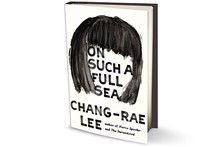If You Loved The Hunger Games...
You'll
love these page-turning dystopian novels, also known as Girl vs. Dark,
Futuristic World.

6 of 7
On Such a Full Sea
By Chang-rae Lee
368 pages;
Riverhead
Chang-Rae Lee's novels are renowned for their grace and restraint, their careful dissections of their characters' inner lives, but he boldly steps outside his comfort zone in the haunting On Such a Full Sea, a dystopian tale that recalls the work of Cormac McCarthy and Kazuo Ishiguro. Here Lee weaves multiple plots into an ambitious epic showcasing a fearless fish-tank-diver heroine as she treks across a devastated landscape.
Set in the distant future, On Such a Full Sea chronicles the odyssey of Fan, a descendent of Chinese immigrants living in the B-Mor (formerly Baltimore), an agricultural hub that funnels customized vegetables and tank-raised fish to the Charter villages, gated communities where plutocrats cruelly dictate the fates of serfs. Interspersed among the villages and B-Mor are the counties, lawless regions where enslavement and murder are the norm. After her boyfriend, Reg, vanishes, the pregnant Fan strikes out on her own, risking physical assaults and reversals of fortune to search for him. The novel gets its strong heartbeat from the allies she finds along the way: a drug-trafficking doctor turned veterinarian; a housekeeper with a dark secret; an emergency-room physician starved for affection. Lee audaciously employs a first-person plural narration, a "we" composed of Fan's neighbors from B-Mor, who comment on her story like a Greek chorus: "There was not a molecule of wrongness about her. Which may be why Fan captured our imagination."
Lee's novel depicts a futuristic America that unnervingly resembles our own. SUVs cruise potholed highways; the rich pamper themselves in gleaming gymnasiums; medical care is auctioned off to the highest bidder. Ultimately Fan reunites not with Reg but with a long-lost brother, a joyous occasion soon tainted by a personal betrayal. With its appealing protagonist as narrative glue, On Such a Full Sea layers stories within stories, building to its final, resonant catharsis.
— Hamilton Cain
Published 03/03/2014


